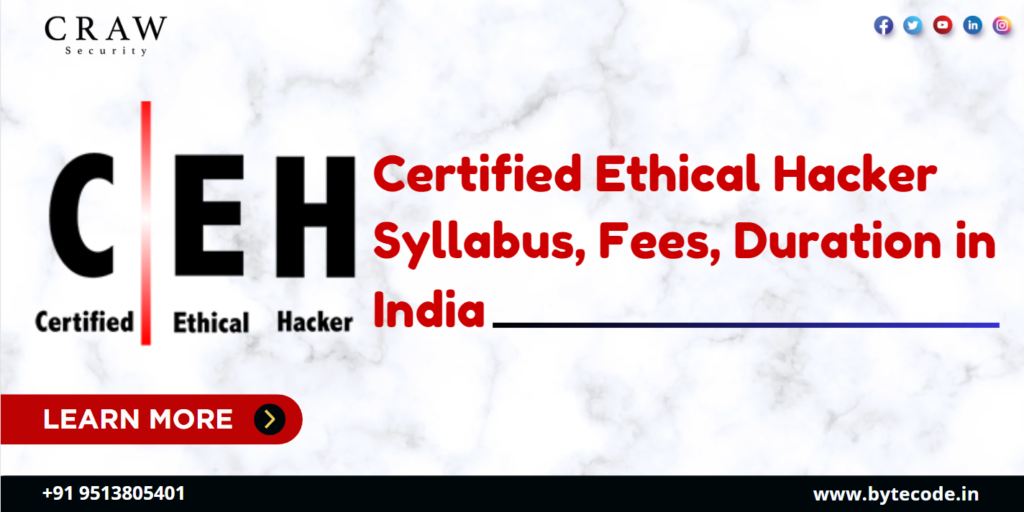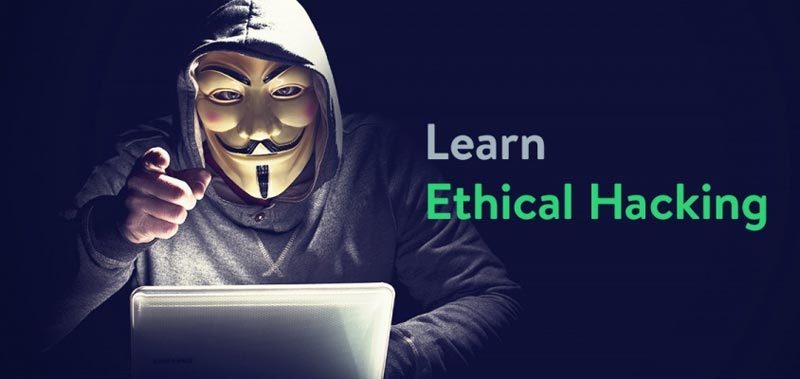Certified Ethical Hacker Syllabus, Fees, Duration
Introduction:
As a result of the advent of the digital age, a new era of cybersecurity issues has begun. To battle these threats, organizations all over the world are looking for trained experts who are able to discover vulnerabilities and take measures to mitigate them. For those who are interested in becoming cybersecurity specialists, the Certified Ethical Hacker (CEH) certification is a benchmark that is recognized all around the world.
In addition to this, Craw Security, a top-notch cybersecurity training institute in India, provides learners with comprehensive CEH training programs that are meant to educate them with the required skills and knowledge to flourish in this rapidly evolving sector.
Moreover, we have tried to give you every small to major detail regarding the Certified Ethical Hacker Syllabus in this article.
EC Council CEH Syllabus: A Deep Dive
The CEH curriculum that is offered by the EC Council has been rigorously organized in order to provide students with a comprehensive understanding of ethical hacking approaches. It covers a wide variety of subjects to give you a specialized CEH Syllabus Overview, including the following:
- Fundamental Security Concepts,
- Footprinting and Reconnaissance,
- Scanning and Enumeration,
- System Hacking,
- Network Hacking,
- Web Hacking,
- Wireless Hacking,
- Mobile Hacking,
- Cryptography,
- Social Engineering,
- Denial of Service (DoS) and Distributed Denial of Service (DDoS),
- Malware Threats,
- Legal and Ethical Hacking, and many more.
Explore the Main Topics of the CEH Exam
It is absolutely necessary to have a solid understanding of the fundamental ideas to perform well on the CEH exam. These are some of the important areas that are covered in Craw Security’s training programs:
| Footprinting and Reconnaissance | Obtain information about the systems of interest without leaving any traces behind. |
| Scanning and Enumeration | Utilizing scanning technologies to locate open ports, services, and vulnerabilities in a system. |
| System Hacking | Utilizing vulnerabilities in the system to obtain unauthorized access. |
| Network Hacking | Integrating a variety of attack methods into the network infrastructure to compromise it. |
| Web Hacking | Determine vulnerabilities in online applications and then exploit such flaws. |
| Wireless Hacking | Defeating wireless networks and protecting wireless infrastructure are both important. |
Complete List of CEH Modules
The CEH training provided by Craw Security includes all of the fundamental courses that have been outlined by the EC Council. The course material is intended to offer students with both theoretical and practical experience in a working environment.
- Module 01: Introduction to Ethical Hacking
- Module 02: Footprinting and Reconnaissance
- Module 03: Scanning Networks
- Module 04: Enumeration
- Module 05: Vulnerability Analysis
- Module 06: System Hacking
- Module 07: Malware Threats
- Module 08: Sniffing
- Module 09: Social Engineering
- Module 10: Denial-of-Service
- Module 11: Session Hijacking
- Module 12: Evading IDS, Firewalls & Honeypots
- Module 13: Hacking Web Servers
- Module 14: Hacking Web Applications
- Module 15: SQL Injection
- Module 16: Hacking Wireless Networks
- Module 17: Hacking Mobile Platforms
- Module 18: IoT Hacking
- Module 19: Cloud Computing
- Module 20: Cryptography
CEH Exam Tips
A comprehensive preparation and the utilization of efficient study methods are required in order to pass the CEH exam. Craw Security provides you with helpful exam strategies and recommendations that can assist you in achieving success.
CEH Certification Guide
The complete CEH certification guide that we offer offers step-by-step instructions on the certification procedure, which includes eligibility requirements, exam registration, and preparation tactics.
CEH Tools and Techniques
Practical abilities are emphasized throughout the CEH certification. Through Craw Security’s training, you will gain practical expertise in the use of ethical hacking tools and techniques that are considered to be industry standards.
FAQs
About Certified Ethical Hacker Syllabus Fees, Duration 2025
1: What is the syllabus of CEH?
The CEH syllabus covers a broad spectrum of ethical hacking topics, including:
- Module 01: Introduction to Ethical Hacking
- Module 02: Footprinting and Reconnaissance
- Module 03: Scanning Networks
- Module 04: Enumeration
- Module 05: Vulnerability Analysis
- Module 06: System Hacking
- Module 07: Malware Threats
- Module 08: Sniffing
- Module 09: Social Engineering
- Module 10: Denial-of-Service
- Module 11: Session Hijacking
- Module 12: Evading IDS, Firewalls & Honeypots
- Module 13: Hacking Web Servers
- Module 14: Hacking Web Applications
- Module 15: SQL Injection
- Module 16: Hacking Wireless Networks
- Module 17: Hacking Mobile Platforms
- Module 18: IoT Hacking
- Module 19: Cloud Computing
- Module 20: Cryptography
2: Is CEH a hard exam?
Due to the breadth and depth of the CEH exam, it is considered to be a hard examination. A wide variety of subjects are covered, and it is necessary to have both theoretical knowledge and practical comprehension of the subject matter. The goal can be accomplished, however, with the right amount of preparation and practice.
3: What certification is needed for ethical hackers?
Despite the fact that there is no one certification that is required for ethical hackers, the Certified Ethical Hacker (CEH) certification is among the most well-known and regarded qualifications in the business. CompTIA Security+, Offensive Security Certified Professional (OSCP), and Certified Information Systems Security Professional (CISSP) are a few further important credentials.
4: Does CEH require coding?
Although having a fundamental understanding of programming is not something that is strictly required for the CEH exam, it can be useful to have such an understanding. In order to make use of the tools and scripts that are utilized in ethical hacking, it is beneficial to have a solid understanding of scripting.
5: Can I self-study for CEH?
Yes, you are able to prepare for the CEH exam on your own. It is possible to access a wide variety of study materials, practice exams, and internet tools. You can, however, considerably improve the quality of your learning experience by participating in structured training provided by a good institution.
6: Can a beginner take CEH?
Beginners are able to take the Certified Ethical Hacker (CEH) test; nevertheless, it is advised that they have a fundamental understanding of networking and security concepts. People who are just beginning their adventure into the world of cybersecurity will find the CEH to be an appropriate resource because it is designed to provide a full overview of ethical hacking.
7: What are the fees of CEH in India?
The costs associated with obtaining a CEH certification in India might differ from one training provider to another, as well as depending on the type of course being taken (classroom, online, or self-paced). In general, the fees fall somewhere between 87,000 and 88,000 Indian Rupees.
8: Is CEH entry-level?
In the field of cybersecurity, the Certified Ethical Hacker (CEH) certification is, in fact, considered an entry-level credential. In addition to offering a solid grounding in the fundamentals of ethical hacking, it frequently serves as a stepping stone to more advanced certification positions.
9: Why is CEH so expensive?
The value that being certified as a CEH gives to professionals working in the cybersecurity field is reflected in the cost of the certification. In addition to covering a comprehensive curriculum, it provides access to training resources and practice exams, and it is acknowledged all over the world. In addition, the process of certification includes a stringent evaluation to guarantee that quality criteria are met.
Conclusion
In the bottom line, we would like to say that Craw Security is the leading provider of cybersecurity courses in Delhi NCR and almost Pan India. For more info, you may visit the Official Website of Craw Security or give us a call at our hotline mobile number +91-9513805401.
Learners may even seek a demo session with our professional cybersecurity training experts.


